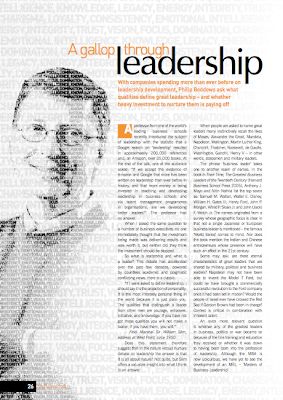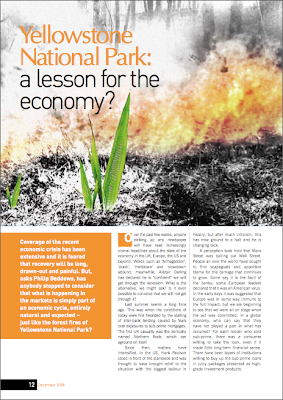A gallop through leadership
A gallop through leadership
Author: Philip Beddows
Originally published in The Boardroom Magazine: July 2008
With companies spending more than ever before on
leadership development, Philip Beddows ask what qualities define great
leadership – and whether heavy investment to nurture them is paying off
A professor from one of the world’s leading business
schools recently introduced the subject of leadership with the statistic that a
Google search on ‘leadership’ resulted in approximately 200,000 references and,
on Amazon, over 35,000 books. At the end of the talk, one of the audience asked:
“If we accept the evidence of Amazon and Google that more has been written on
leadership than ever before in history, and that more money is being invested
in teaching and developing leadership in business schools and via talent
management programmes in organisations, are we developing better leaders?” The
professor had no answer.
When I posed the same question to a number of business
executives no one immediately thought that the investment being made was
delivering results and was worth it, but neither did they think the investment
should be stopped.
So what is leadership and what is a leader? This debate
has accelerated over the past few decades, powered by countless academic and
pragmatic conflicting views. Here is a classic:
“If I were asked to define leadership, I should say it
is the projection of personality. It is the most intensely personal thing in
the world because it is just plain you. The qualities that distinguish a leader
from other men are courage, willpower, initiative, and knowledge. If you have
not got those qualities you will not make a leader; if you have them, you
will.”
– Field Marshal Sir William Slim, address at West Point,
circa 1950
Does this statement therefore suggest that in the nature
versus nurture debate on leadership the answer is that it is all about nature?
Not quite, but Slim offers a valuable insight into what I think is an answer.
When people are asked to name great leaders many
instinctively recall the likes of Moses, Alexander the Great, Mandela,
Napoleon, Wellington, Martin Luther King, Churchill, Thatcher, Roosevelt, de
Gaulle, Washington, Gandhi, Henry V – in other words, statesmen and military
leaders.
The phrase ‘business leader’ takes one to another realm
of names. In the book In Their Time, The Greatest Business Leaders of the
Twentieth Century (Harvard Business School Press 2005), Anthony J. Mayo and
Nitin Nohria list the top seven as: Samuel M. Walton, Walter E. Disney, William
H. Gates III, Henry Ford, John P. Morgan, Alfred P. Sloan Jr. and John (Jack)
F. Welch Jr. The names originated from a survey whose geographic focus is clear
in that not a single Japanese or European business leader is mentioned – the
famous ‘World Series’ comes to mind. Nor does the book mention the Indian and
Chinese entrepreneurs whose presence will have such an effect in the 21st
century.
Some may ask: are there eternal characteristics of great
leaders that are shared by military, political and business leaders? Napoleon
may not have been able to invent the Model T Ford, but could he have brought a
commercially successful revolution to the Ford company once it had been set in
motion? Would the people of Israel ever have crossed the Red Sea if Gordon
Brown had been in charge? Context is critical in combination with inherent
talent.
An even more relevant question is whether any of the
greatest leaders in business, politics or war became so because of the fine
training and education they received or whether it was down to having been born
into the profession of leadership. Although the MBA is now ubiquitous, we have
yet to see the development of an MBL – ‘Masters of Business Leadership’.
When someone is found to be a great leader do they
always remain so? The answer appears to be that leaders have a sell-by date.
When Gordon Brown became Prime Minister, after an extraordinarily long time as
Chancellor of the Exchequer, his first few months were lauded as proof a year later, he is written off by some as yesterday’s
man.
Business leaders also have sell-by dates – the average
tenure of CEOs has become notoriously short, such that Enoch Powell’s famous
phrase that “all political careers end in failure” could be thought to be
equally applicable to business. The current credit crisis has claimed many big
names – Stan O’Neal of Merrill Lynch and Chuck Prince of Citigroup to name two.
Like salespeople judged on the quality of their last sale, business leaders can
often find their legacy tarnished by their last set of financial results.
Employees, shareholders, voters and the media have tended to become ever more
impatient, leaving little time for leaders to implement longer term strategies
and demonstrate success.
The heading of the second chapter of the book Living
Leadership, a Practical Guide for Ordinary Heroes, written by George Binney,
Gerhard Wilke and Colin Williams, is, The End of Superman, ‘Don’t be a Hero’.
One of the leaders in their research asked them what they thought of charisma
and whether it was essential for an effective leader. The authors state that
their book’s bold message is that, “in the last 20 years the business and
organizational world has overdosed on the idea of leaders as transformational
heroes.” They argue that the transformational model of leadership, “doesn’t
work, has many damaging consequences and is now crumbling”. Most of the heroes,
they go on to say, have fallen – they provide as examples Jack Welch, Percy
Barnevik, Kenneth Lay and George Simpson. Yet, they tell us with surprise,
people in the business and organisational world continue to look for heroic
figures.
“Living Leadership is saying that it is time to ring the
death knell for the heroic leader and the age of permanent and ever faster
change” write the authors. “Both imploded when the e-commerce bubble burst and
Enron was exposed for what it is”.
Time to reach for the fundamentals then, and ask what
really makes great leaders.
There are 11 possible eternal characteristics of great leaders,
whatever their variety:
Integrity and trust – people do not like following
leaders who display a lack of integrity or cannot be trusted.
Vision – people like to be inspired.
Show me someone who looks for uninspiring leaders.
Focus – leaders need to be focused on
the job they have been appointed to do, not constantly changing tack with
each new whim or fad.
The will to dominate (not in the
domineering sense) – leaders have to be able to take charge even if they devolve
power.
Charisma – that magic element that draws
people to some leaders. Charisma doesn’t have to be loud.
Loyalty and consistency – leaders need to give loyalty
even more than they request it from others. They also need to be consistent.
A tough leader can be tolerated if people see that they are equally tough to
all, especially themselves.
Emotional intelligence – read the books!
Knowledge of their subject – who is going to follow a bank
head who doesn’t know about finance? Experience brings practical and
marketplace understanding.
Legacy orientated – leaders with an eye to their
future legacy are far more likely to be wiser, more responsible and more
dedicated to ensuring that they have talent developed, deployed or available
to cover future succession needs.
Energy – a sloth will be unlikely to
win many races in business, politics or war. A tired worn-out leader is
unlikely to inspire confidence.
Courage – without this no challenge can
be effectively overcome or visionary objective reached.
|
Sharp readers will notice that only one of these
characteristics has a clear connection with academic learning – knowledge. Can
all the others be learned, or are they just there?
My belief is that leadership cannot be taught per se.
Neither do I believe that leaders are born. The critical factor is that the raw
ingredients have to exist in order for anyone to be able to develop as a
leader.
Culture is also very important and will come much more
to the fore as we experience the continuing historical shift of power and
influence from west to east. Like beauty, leadership is in the cultural eye of
the beholder. The greatest leader in one part of the world may not be viewed as
such by another. Leadership characteristics that are valued will be different
in each culture, but there will still be some commonalities.
The story of champion racehorse Seabiscuit points us to
another interesting fact – top talent may not emerge from the obvious candidates
and may never reach the heights without the right team around them. To get
champion racehorses you have to be prepared to breed and invest in a lot of
stock, the majority of which will never win a race, let alone run in one –
leadership training and development must be the same. Without any investment in
development or exposure to experience, most leadership potential will never see
the light of day.
Leaders must provide the necessary environment and
opportunity for future leaders to develop and emerge. The words of Sir Phillip
Sidney – “A brave captain is as a root, out of which, as branches, the courage
of his soldiers doth spring” – may well be amended for today’s world to: “A
wise leader is as a root, out of which, as branches, the talents of his men and
women doth spring”.
To return to the original question – is the level of
leadership development and training worth the investment?
My conclusion is that as much well-focused and
intelligently thought- through investment as possible should definitely be made
in leadership, whether at business schools, through talent and leadership
initiatives or via the use of mentoring and coaching. The raw ingredients that
are appropriate for each situation, organisation and culture need to be
present, but without the right nurture, management and experiences to add, the
talent will never achieve its promise.



Comments
Post a Comment